19 June 2019
Newsletter Articles
Principal’s Report
Welcome to week eight of a productive term of learning as we near the end of Semester Two. Teachers have completed final assessments and reports and we have seen improved student outcomes over the semester. Curriculum Reports and Individual Language Plan Reports will be posted to parents in week 10. Students will also bring home work sample files and we hope you enjoy talking to your children about their achievements.
PLDS hosted our annual Open Day on Monday 10th June where we welcomed visitors and prospective parents to PLDS. The purpose of the day was to provide visitors with information about our school and the referral procedures, along with the opportunity to tour our school and see the work done in classes. Feedback from attendees was very positive about the information received and the work teachers are doing in classes. I would like to thank Mrs Heather Phillips for talking to the attendees from a parent’s perspective.
Our dedicated PLDS Teachers and Education Assistants attended Occupational Therapy and Music Professional Learning last Saturday. Our educators are enjoying implementing the sensory learning strategies and incorporating music into everyday activities.
PLDS were successful in applying for the PALS grant. PALS stands for Partnership, Acceptance, Learning, Sharing and the grant is used to celebrate Aboriginal culture with our students and community. This year we will be using the grant during NAIDOC week where Wayne Devine will be working with students at the RLPS campus.
The new garden in the Kindy area onsite is taking shape thanks to donations from Bunnings and Mrs Hirsiger has been adding a mural to the outside wall of her art room. We hope you have a moment to visit the areas to see the sustainable initiatives to the school.
Students in Pinjarra have been talking about persistence when learning. Mandurah students joined together for an exciting afternoon of STEM activities and students at Bungaree have been exploring visual arts and the use of colour.
Stay warm and have a safe and happy weekend.
Shelley Collins
Principal
Important information for Parents
Attendance
Developing the habit of going to school every day is vitally important so your child does not miss out on important ideas, concepts, knowledge and skills they need for future learning.
Going to school every day helps children learn the important life skill of ‘showing up’ – at school, at work, to sport and other commitments.
Did you know?

- In the early years of school, many concepts, such as literacy and numeracy, are taught in a sequence. This means that if your child is often away from school, it can make it difficult to catch up later.
- The Western Australian Telethon Kids Institute has found that the attendance habits set in Kindergarten and Pre-Primary are likely to continue throughout a child’s school life, so it is important for them to go to school every day.
- The School Education Act 1999 requires all enrolled students to attend every day that their school is open.
Pinjarra Campus
Room 29
‘You Can Do It’

Over the past few weeks the students have been learning about Penny Persistence during weekly ‘You Can Do It’ activities. The students have discussed their strengths and weaknesses as learners and begun to identify some learning strategies to assist them become more persistent, confident and adaptable. During this week’s session the students set goals for their personal learning in the classroom. All students’ used their developing understanding to create some commendable personal goals for the week ahead.
STEM ‘Where the Wild Things Are’
Last week our wonderful Notre Dame teaching student Miss Booth immersed the students in the well-known children’s book ‘Where the Wild Things Are.’ Students were treated with an exciting STEM challenge at the conclusion of the week that involved creating a boat from common materials including cardboard, aluminium foil and lots and lots of sticky tape. Every student created different and interesting designs for their boat and worked well in groups by delegating roles for each participant, being persistent when experimenting and making changes, and discussing and evaluating their designs. It was a wet and windy day here at Pinjarra PS for sailing, however all boats managed to float with grace and ingenious attention to detail.
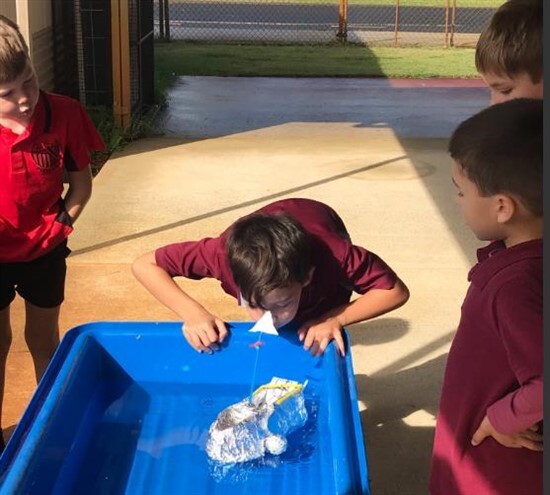
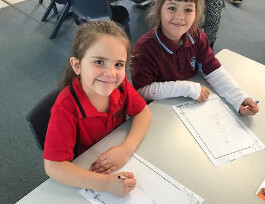
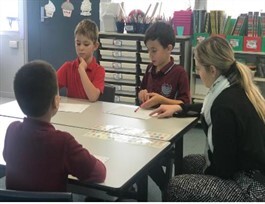
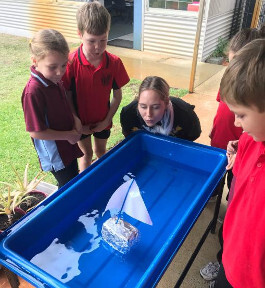
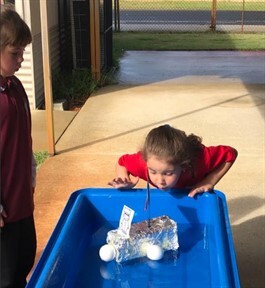
Room 30 Pinjarra
Room 30 our class moto is ‘everyday counts’. The students know the importance of regular school attendance to reach their learning goals. They celebrated reaching their attendance goal with a class party. They had fun while also learning and practising important social skills such as team work and communication while they took part in the Marshmallow Tower Challenge. The children were given 20 sticks of dry spaghetti, 1 metre of tape, 1 marshmallow and 20 minutes to work together in their groups to build the tallest, free standing structure with the marshmallow on top. The winner’s tower was 26cm tall.
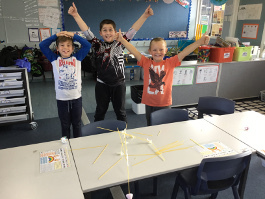
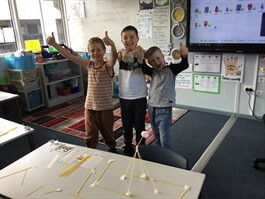
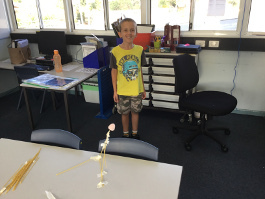
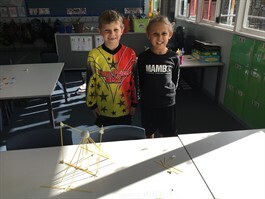
RLPS Campus
1.6
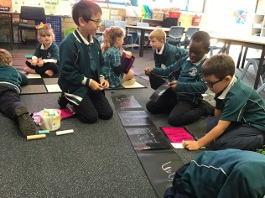
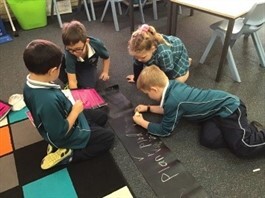
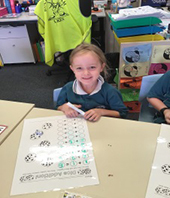
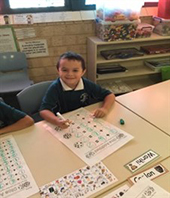
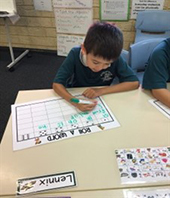
This term has been extremely busy in 1.6. We have had our heads down and bottoms up working our hardest in all areas of our learning and I must say we are doing a fantastic job. This term we have been doing lots of different assessments in the classroom, showing how well we are progressing with our writing, reading, spelling and our maths. We are definitely making great progress in all areas and are extremely proud. We have been trying lots of different ways to remember and practice our spelling. Check out our fantastic work below.
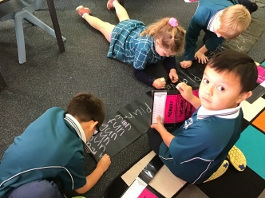
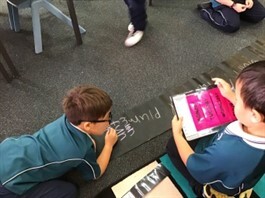
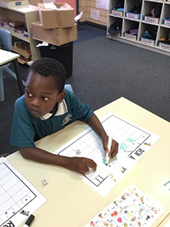
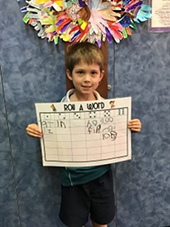
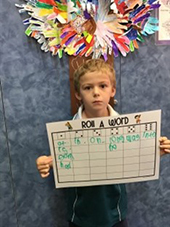
OBJECT-BASED NEWS TELLING
We have started to use our “Object-Based News Telling” this term and are doing a fantastic job learning all about our friends likes and dislikes through lots of great questioning. Our speaking and listening is improving every day and Ms Turner and Mrs Buchanan are so excited to watch and listen to our news.
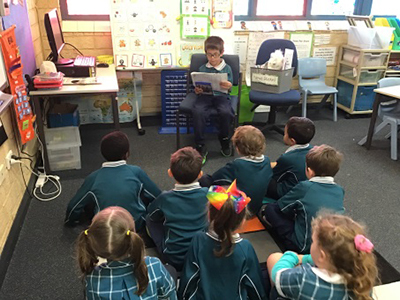
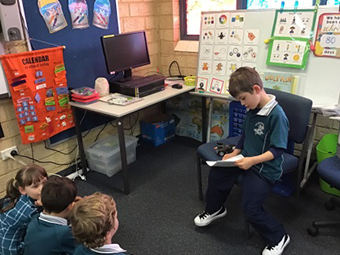
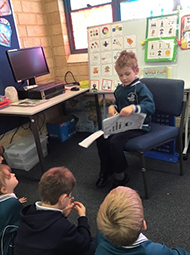
BUGS
Guess what? WE HAVE BUGS!
Yes, BUGS – at the beginning of the year Ms Turner brought in some Spiny Leaf Insects and we watched them shed and grow; now they are HUGE. Then one day we came in to class and there was another enclosure, it was empty with a note on it – which said “What is coming to live here?”. We had NO idea. Then we got a package in the mail delivered to our class, you will never guess what it was? MORE bugs. Though not the same, these ones are called Montieth Leaf Insects and they are just like leaves. You have to look SO hard to find them, they are amazing at hiding. We have been watching and looking after our bugs so well they are growing and thriving. Our Spiny Leaf Insects are now fully grown and laying eggs. We can’t wait for them to hatch.
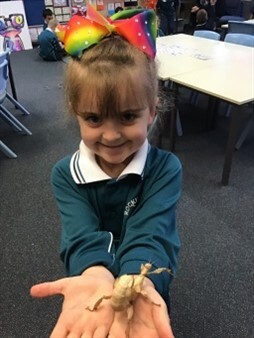
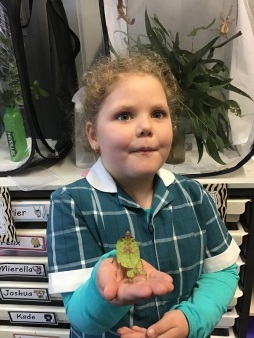
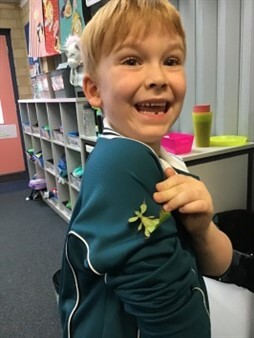
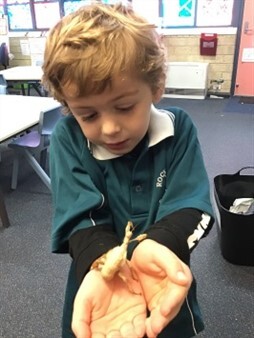
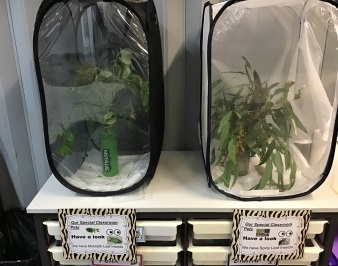
We have been joining up with our Year One buddy class 1.3 every Friday afternoon. We have fun interacting with our friends and enjoy lots of different educational activities. We are especially excited to go in and use Mrs Katheappa’s Lego to build some amazing creations. This has been great as we are now using our own classroom Lego to design and make spaceships.
It has been a very busy and exciting term. We can’t wait for term three.
1.3 Lego Donations

Mandurah Campus
On Friday the 31st of May all of our Peel Language classes joined together for an afternoon of STEM activities that enabled students to explore forces and motion. Students rotated through three different activities, where they worked collaboratively with a buddy to explore, discuss, share, create, design, test, adapt and modify their ideas. Throughout the afternoon students created pendulum paintings, paper bag kites and different types of helicopters. There was lots of fun had by all. We look forward to our next round of STEM activities. Here are some of our photos.
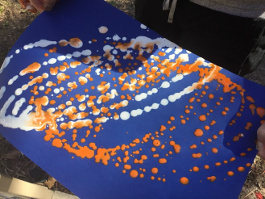
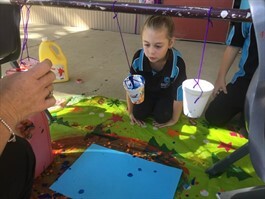
Pendulum paintings
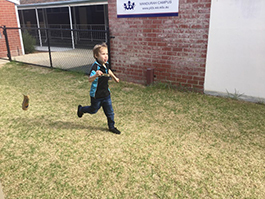
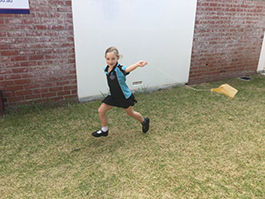
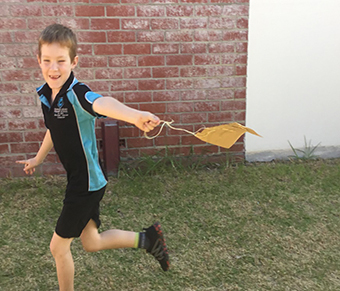
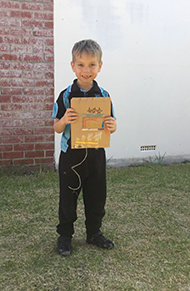
Kite construction and testing out how well they can fly
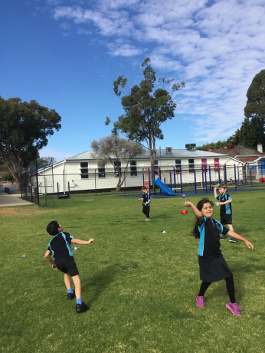
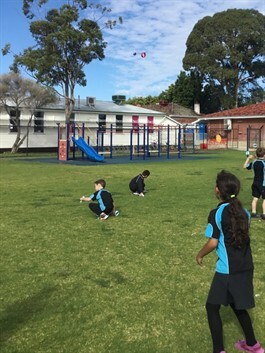
Helicopter testing
Bungaree Campus
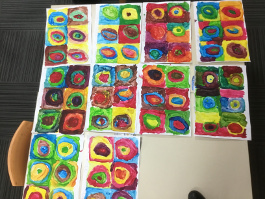
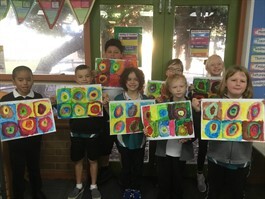
In Room 3, we have been exploring with visual arts. We learnt about the work of a famous Russian Artist called Wassily Kandinsky. He was the first painter to stop painting pictures of things and instead painted just using colours and shapes. He believed that this let him paint honestly about his feelings. Often Kandinsky would listen to music while he painted and try to paint what he heard. Kandinsky thought a lot about what colours mean and how they make people feel. He believed that colours had a soul.
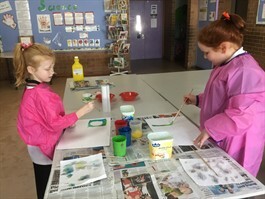
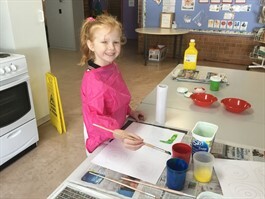
In our lesson we learnt how to mix colours, tints and shades. We learnt that if we mixed the colour red and yellow we get an orange colour. We then used our colours to paint and create a circle painting. We learnt interesting facts about Kandinsky and his life and got to view many of his works. We also learnt that Kandinsky was the first artist to come up with abstract painting.
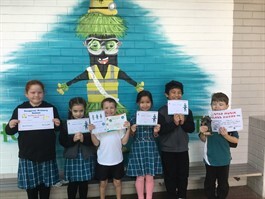
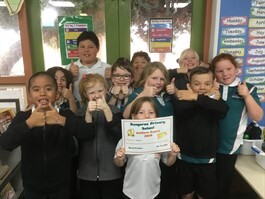
Congratulations to all students who received the 'Respect Award'
Congratulations to Room 2 for scooping the Music Award and Room 3 for scooping the Uniform Award yet again. This is our third time, keep up the good work Room 3.
Fun With Language
FUN WITH LANGUAGE
Colouring-in with a purpose!

- Have two copies of a colouring in sheet
- Take turns between adult and child to tell each other what to draw or colour (e.g. ‘colour the bird blue’ or ‘colour the sun yellow and orange’)
- Give odd instructions (e.g. colour the sun pink) and explore other concepts (e.g. draw a circle around the bird, draw a triangle on top of the pole)
- Compare pictures at the end to see how similar they are!
Crunch & Sip
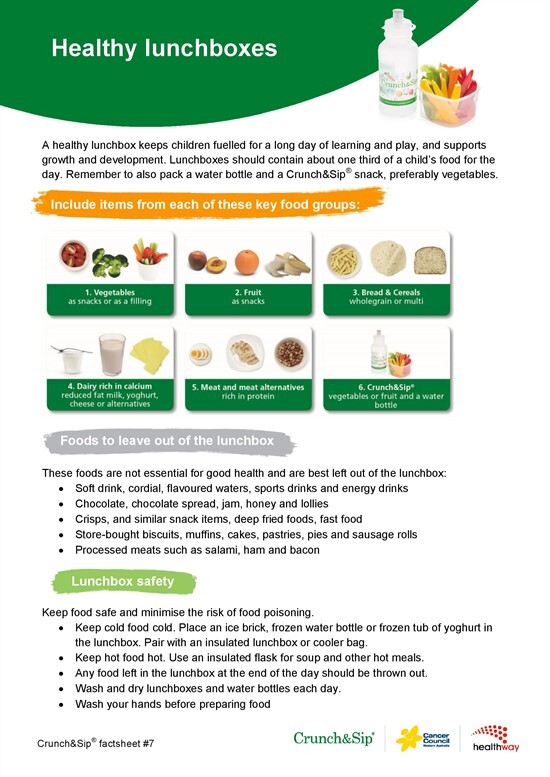
School Nurse
Whooping Cough
Whooping cough (Pertussis) is a bacterial infection. The infection is spread by droplets that are coughed or sneezed out. The illness usually starts with a runny nose and a cough, with long spells of coughing. The person will have many quick coughs in one spell and there will be an average of 25 coughing spells a day. After a spell, young children may ‘whoop’. They may also vomit. The coughing spells will start to subside after several weeks.
If your child has whooping cough or has come in contact with whooping cough, see your doctor. Antibiotics are usually prescribed to treat whooping cough. Check that your child eats and drinks enough while they are sick.
The child should stay away from school until five days after starting treatment, or if not treated, for three weeks from the start of symptoms. Any children under seven who have not been immunised and have been in contact with someone with whooping cough should be kept away from school for 14 days after the contact, or until they have been on antibiotic treatment for at least five days.
For more information on whooping cough, see the fact sheet at Healthy WA – Pertussis or
https://beta.health.gov.au/health-topics/immunisation?utm_source=immunise_australia_program&utm_medium=redirect&utm_campaign=digital_transformation
Influenza
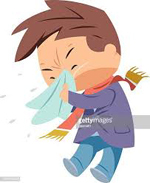
Influenza, or the ‘flu’ is caused by an influenza virus. It is spread through the air when someone coughs, sneezes or talks. It is also spread by touching something that has the virus on it and then touching your nose, eyes or mouth. Common symptoms include sore throat, cough, fever, headache, chills, tiredness and muscle aches.
People with the flu should rest and drink plenty of fluid. Use paracetamol in recommended doses if necessary - but do not give children any medication containing aspirin.
Be sure to keep your child home from school while he or she is sick. If you require school work for your child contact the school to prepare some for you to collect.
The best way to prevent flu from spreading is by washing your hands regularly and after coughing, sneezing or blowing your nose.
Flu vaccines are available prior to winter starting. For more information, contact your GP or local Immunisation Clinic.
Why should I consider having my child vaccinated against the flu?
The National Health and Medical Research Council, Australia's peak body for health advice, recommends annual vaccination for anyone six months of age or older who wants to reduce their chances of becoming ill with the flu.
Annual flu vaccination is strongly recommended for anyone six months of age or older with a medical condition that places them at higher risk of severe illness from flu. Children and adults with heart, lung or kidney disease or a weakened immune system, are eligible for free flu vaccine through the National Immunisation Program.
Children without underlying medical conditions who become infected with flu can also develop serious illnesses. Flu can cause high fever and pneumonia, and make existing medical conditions worse. Flu can also cause convulsions and diarrhoea in children.
Influenza viruses are always changing. Each year scientists try to match the strains of influenza viruses in the vaccine to those most likely to cause flu illnesses that year. It takes up to two weeks for protection to develop after vaccination against flu and protection lasts about a year.
The seasonal flu vaccine is available on prescription or via GP and immunisation clinics and is provided free for certain groups. Flu vaccines are available prior to winter starting. For more information visit the link below or contact your GP or Immunisation Clinic.
http://healthywa.wa.gov.au/immunisation
Community News


